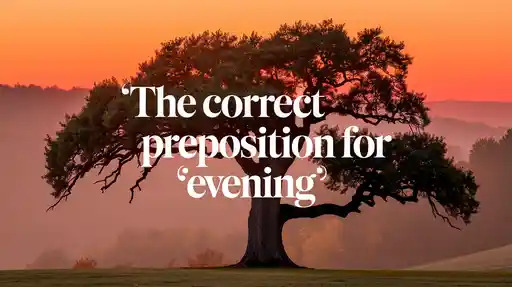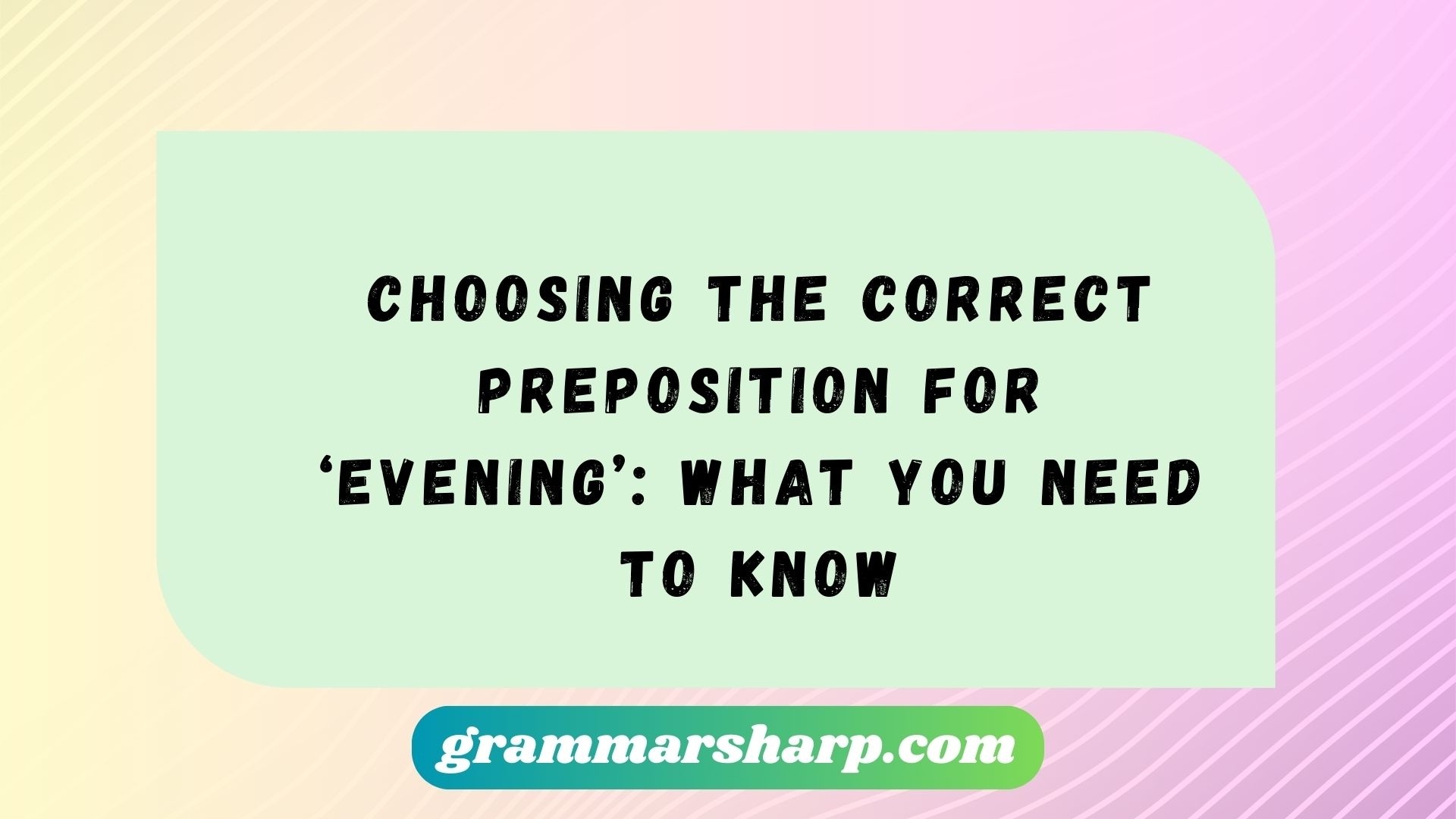Have you ever hesitated before saying “in the evening,” “at evening,” or “on evening”? If so, you’re not alone. Prepositions can feel tricky even for advanced English learners. Small words like in, on, and at may seem insignificant, but they play a massive role in how natural your sentences sound.
When we talk about time expressions, especially parts of the day such as morning, afternoon, evening, and night, the choice of preposition makes all the difference. Using the wrong one can make your sentence sound awkward, confusing, or downright incorrect. For example, “I will meet you on evening” immediately signals that the speaker isn’t comfortable with natural English usage.
The challenge comes from the fact that prepositions don’t always follow rigid logic. Instead, they often follow patterns of usage that developed over centuries of English. That means memorization helps, but so does understanding the rules, exceptions, and idiomatic uses.
In this article, we’ll break down everything you need to know about choosing the correct preposition for “evening.” You’ll learn the rules, spot common mistakes, and see practical examples that clarify usage. We’ll also compare “evening” to “night,” examine regional differences, and explore idiomatic expressions you’ll hear in everyday conversations. By the end, you’ll be able to confidently choose the right preposition every time you talk about the evening.
Understanding Prepositions of Time
Before we dive into “evening,” let’s revisit what prepositions of time are. These small words link a noun (like “evening”) to another element in a sentence, showing relationships of time, place, or direction.
The three most common prepositions of time are:
- In → Used for longer, less specific periods (e.g., in the morning, in July, in 2025).
- On → Used for specific days or dates (e.g., on Monday, on July 4th).
- At → Used for specific points in time (e.g., at 5 o’clock, at night).
Here’s a quick comparison table:
| Preposition | Used For | Examples |
| In | General periods of time | in the morning, in summer, in 2022 |
| On | Specific days/dates | on Monday, on Christmas Day |
| At | Exact times or specific points | at 6 PM, at night, at noon |
Understanding this framework helps us place “evening” in the right category.
The Correct Preposition for “Evening”

The standard and most widely accepted form is: in the evening.
Why? Because evening is considered a general time period, not a precise moment. It’s similar to morning and afternoon. You wouldn’t say “on morning” or “at afternoon.” Instead, you use in.
Examples:
- I usually take a walk in the evening.
- We’ll discuss the project in the evening after dinner.
- She likes to write in the evening when it’s quiet.
Notice that we always use the article “the” here: “in the evening.” Omitting it (“in evening”) sounds unnatural in standard English.
When to Use “At Evening”
Technically, you might stumble upon “at evening” in older literature, poetry, or religious texts. It was more common in archaic English but has almost disappeared in modern usage.
For example, in older texts you might find:
- “He returned home at evening with a heavy heart.”
Today, native speakers would instead say
- “He returned home in the evening with a heavy heart.”
So when is “at evening” acceptable? Only in poetic or stylistic contexts where a writer deliberately chooses archaic phrasing. In modern spoken and written English, it sounds outdated.
Why “On Evening” is Incorrect
The phrase “on evening” is grammatically incorrect in standard English. Preposition “on” is used with days and dates, not with parts of the day.
❌ Wrong: We’ll meet on evening.
Correct: We’ll meet in the evening.
However, “on” can appear when paired with a specific day or occasion:
- We’ll meet on Monday evening.
- They had dinner together on Christmas evening.
Here’s a quick reference table:
| Expression | Correct? | Example |
| on evening | ❌ Wrong | — |
| on Monday evening | ✅ Correct | We met on Monday evening. |
| on Christmas evening | ✅ Correct | They visited on Christmas evening. |
Comparing “Evening” vs. “Night” Prepositions
Learners often confuse in the evening with at night. Both describe times after sunset, but they carry different meanings.
- In the evening → Refers to the period from late afternoon until around 9 PM.
- At night → Refers to the later hours, usually after 9 PM until early morning.
Examples
- We usually eat dinner in the evening.
- I can’t sleep well at night.
- She studies in the evening but relaxes at night.
Think of evening as the early dark hours and night as the late dark hours.
Common Mistakes with “Evening” Prepositions
Here are mistakes learners often make:
- ❌ Saying “on evening” instead of “in the evening.”
- ❌ Dropping the article “the” (“in evening” instead of “in the evening”).
- ❌ Using “at evening” in casual conversation.
- ❌ Mixing up evening and night (“I’ll call you at evening” instead of “in the evening”).
Correct usage examples
- I’ll see you in the evening.
- The party starts in the evening and continues at night.
Regional and Stylistic Variations
Both American and British English use “in the evening” as the standard. However, stylistic preferences can differ slightly
- In British English, speakers may say “by evening” or “towards evening” more often.
- In American English, you’ll hear “around 7 in the evening” or “later in the evening.”
Writers may also bend the rules in poetry, literature, or speeches, but in daily life, “in the evening” remains the gold standard.
Prepositions with Specific Times in the Evening
When you add a specific clock time, the preposition shifts. You no longer say “in the evening” alone; you add detail.
Examples:
- We’ll meet at 6 in the evening.
- The movie starts at 8 in the evening.
- She arrived around 7 in the evening.
Here’s a handy chart:
| Usage | Example |
| At + exact time + in the evening | We’ll meet at 6 in the evening. |
| Around + time + in the evening | Dinner is around 7 in the evening. |
| Until + evening | He worked until evening. |
| By + evening | We’ll finish by evening. |
Idiomatic Expressions with “Evening”
English is full of idiomatic expressions using “evening.” These add nuance and natural flow to your speech
- By evening → before evening ends
- Example: The guests had arrived by evening.
- Toward(s) evening → as evening approaches
- Example: The sky turned golden towards evening.
- Until evening → continuing until evening begins
- Example: He studied until evening without a break.
- Of an evening (British, old-fashioned) → usually in the evening
- Example: They play cards of an evening.
Idiomatic use enriches language and makes you sound more like a native speaker.
Practice Examples and Quick Quiz
Test yourself! Fill in the blanks with the correct preposition.
- We usually go jogging ___ the evening.
- The wedding took place ___ Saturday evening.
- She prefers working late ___ night.
- The lights were glowing beautifully ___ the evening.
- The train arrived ___ 8 in the evening.
Answer Key
- in the evening
- on Saturday evening
- at night
- in the evening
- at 8 in the evening
Conclusion
Choosing the correct preposition for “evening” doesn’t have to be confusing. Remember:
- Use in the evening for general time.
- Avoid “on evening” — it’s incorrect unless combined with a day or date.
- Recognize that “at evening” is archaic and rarely used today.
- Distinguish between in the evening and at night to avoid mistakes.
- Use idiomatic forms like “by evening” or “towards evening” to sound natural.
The key lies in asking yourself: Am I describing a general time span or a specific point in time? Once you frame it that way, choosing the right preposition becomes second nature.
FAQs About Choosing the Correct Preposition for “Evening”
What is the correct preposition for “evening”?
The correct preposition is “in the evening.” For example: I go for a walk in the evening.
Can I say “at evening”?
“At evening” is rare and considered old-fashioned. You’ll sometimes see it in older literature, but in modern English people almost always say “in the evening.”
Is it correct to say “on evening”?
No, “on evening” is incorrect. However, you can use “on” with a specific day or occasion such as “on Monday evening” or “on Christmas evening.”
What is the difference between “in the evening” and “at night”?
“In the evening” refers to the time between late afternoon and early night, usually before 9 PM. “At night” refers to later hours, typically after 9 PM until early morning.
Do I need to use “the” in “in the evening”?
Yes, always include the article. The correct form is “in the evening,” not “in evening.

